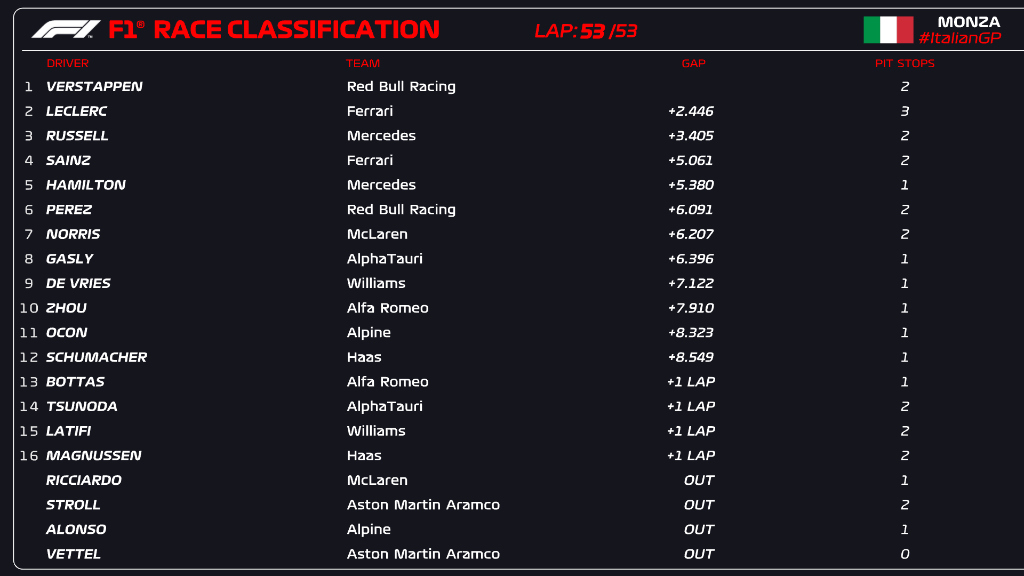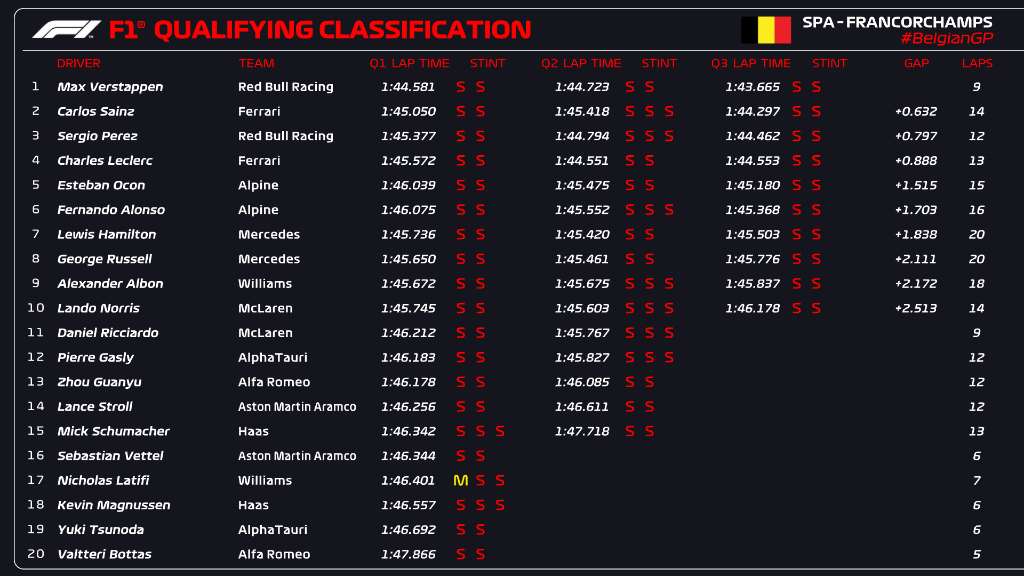Formula 1 results have always been a hot topic among racing enthusiasts. Whether you're a die-hard fan or just curious about the sport, understanding F1 results is like unlocking the secrets of a high-speed world where precision meets passion. From the roar of the engines to the strategic brilliance in the pits, every race tells a story. And today, we're diving deep into the heart of that story to help you make sense of it all.
So why does everyone care so much about F1 results? Well, it's not just about who crossed the finish line first. It's about the drama, the rivalry, the unexpected twists, and the sheer talent on display. Every race weekend is a spectacle, and the results are the culmination of weeks, sometimes months, of preparation. It's like watching a movie where the script is written on the fly, and the ending can change in the blink of an eye.
But here's the deal: if you're new to Formula 1, the jargon, stats, and abbreviations can feel overwhelming. Don't worry, though. We've got you covered. This guide will break it all down for you, step by step, so you can enjoy the thrill of F1 results like a true insider. Let's get started, shall we?
Read also:Exploring The Intriguing Life Of Camilla Araujo Naked Ndash The Untold Story
Understanding the Basics of F1 Results
Before we dive into the nitty-gritty, let's talk about the fundamentals. F1 results aren't just about the final standings. They're a reflection of the entire race weekend, from practice sessions to qualifying and, of course, the main event. Every single moment matters, and understanding these components can give you a deeper appreciation for the sport.
Practice Sessions: The Warm-Up Act
Think of practice sessions as the dress rehearsal before the big show. Drivers get a chance to test their cars, fine-tune settings, and get a feel for the track. These sessions don't directly impact the final F1 results, but they offer valuable insights into the teams' strategies and potential strengths. Here's what you need to know:
- There are usually two practice sessions before qualifying.
- Drivers experiment with different setups to find the perfect balance.
- Weather conditions can play a huge role in shaping the results.
Qualifying: Where the Grid is Decided
Qualifying is where the real drama begins. It's a high-pressure affair where drivers push their cars to the limit to secure the best starting position. The results of qualifying can set the tone for the race, and it's often where the championship battles heat up. Here's how it works:
- Drivers are divided into three elimination rounds: Q1, Q2, and Q3.
- The fastest 10 drivers in Q3 determine the front rows of the grid.
- Pole position is the ultimate goal, giving the driver a significant advantage.
Decoding the Race Results
Now, let's talk about the main event: the race. F1 results from the race itself are what everyone tunes in for. It's where the rubber meets the road, and every decision counts. Whether it's a bold overtaking maneuver or a perfectly executed pit stop, the race is a test of skill, strategy, and endurance.
Points System: How Drivers Earn Points
Understanding the points system is crucial if you want to follow F1 results closely. Here's a quick breakdown:
- The top 10 finishers earn points, with the winner taking home 25 points.
- Second place gets 18 points, third place gets 15 points, and so on.
- The driver who sets the fastest lap during the race earns an extra point, provided they finish in the top 10.
Standings: Tracking the Championship Race
F1 results aren't just about individual races; they contribute to the bigger picture of the championship standings. Both drivers and constructors compete for titles, and the points accumulated throughout the season determine the winners. Here's how it works:
Read also:Mount St Marys The Hidden Gem You Need To Discover
- Drivers' points are tallied individually for the Drivers' Championship.
- Teams accumulate points for the Constructors' Championship based on their drivers' performances.
- Consistency and reliability are key to winning the championship.
Key Players in F1 Results
Behind every F1 result is a team of talented individuals working tirelessly to achieve success. From the drivers to the engineers, everyone plays a crucial role. Let's take a closer look at some of the key players:
Drivers: The Faces of the Sport
Drivers are the stars of Formula 1, and their performances directly impact the F1 results. Each driver brings their own unique style and strengths to the track. Here's a glimpse into the lives of some of the top drivers:
Below is a table showcasing some of the most prominent drivers in F1:
| Name | Team | Championships | Podiums |
|---|---|---|---|
| Lewis Hamilton | Mercedes | 7 | 192 |
| Max Verstappen | Red Bull | 3 | 84 |
| Sebastian Vettel | Aston Martin | 4 | 122 |
Teams: The Backbone of Success
Behind every driver is a team of engineers, strategists, and mechanics working together to achieve success. The top teams in F1 are known for their innovation and dedication. Here's a quick look at some of the most successful teams:
- Mercedes: Dominant in recent years, known for their reliable cars and strategic brilliance.
- Red Bull: A team that combines cutting-edge technology with bold racing tactics.
- Ferrari: The most successful team in F1 history, with a rich legacy and passionate fan base.
Strategies That Shape F1 Results
Formula 1 is as much about strategy as it is about speed. Teams employ various tactics to gain an edge over their competitors, and these decisions can significantly impact the final F1 results. Let's explore some of the key strategies:
Pit Stops: The Art of Timing
Pit stops are a critical component of F1 strategy. They allow teams to change tires, make adjustments, and potentially gain track position. Here's what you need to know:
- Teams decide when and how many times to pit based on tire wear and fuel consumption.
- A well-timed pit stop can help a driver leapfrog competitors during the race.
- Consistency in pit stop execution is crucial to avoid losing time.
Aerodynamics: The Science of Speed
Aerodynamics play a vital role in F1 results. Teams invest heavily in developing cars that can generate maximum downforce while minimizing drag. Here's why it matters:
- Downforce allows cars to corner faster without losing grip.
- Teams constantly tweak their designs to find the perfect balance.
- Innovations in aerodynamics can give a team a significant competitive advantage.
Historical Context of F1 Results
To truly appreciate the significance of F1 results, it's important to understand the history of the sport. Formula 1 has evolved significantly over the years, and the results reflect the changing landscape of the industry. Let's take a trip down memory lane:
The Early Days: The Birth of F1
Formula 1 began in 1950, and the early races were vastly different from what we see today. Cars were less sophisticated, and safety standards were minimal. Despite this, the races were just as thrilling, and the results laid the foundation for the sport's future.
The Modern Era: A New Era of Innovation
In recent years, F1 has embraced technology and innovation like never before. Hybrid engines, advanced aerodynamics, and data analytics have transformed the sport. The results today are a testament to the incredible progress made in engineering and design.
Technology's Role in F1 Results
Technology has revolutionized Formula 1, and its impact on F1 results cannot be overstated. From telemetry to AI, teams leverage cutting-edge tools to gain a competitive edge. Here's how technology is shaping the sport:
Data Analytics: The Secret Weapon
Data analytics has become an essential part of F1 strategy. Teams collect vast amounts of data during practice, qualifying, and the race itself. This data helps them make informed decisions and optimize performance. Here's how it works:
- Sensors on the car provide real-time data on tire wear, fuel consumption, and engine performance.
- Teams use this data to simulate different scenarios and adjust their strategies accordingly.
- Data analytics can help predict potential issues before they become critical.
Hybrid Engines: The Future of Power
Hybrid engines have become the norm in F1, and their efficiency has a direct impact on F1 results. Here's why they matter:
- Hybrid systems combine internal combustion engines with electric motors for enhanced performance.
- They allow drivers to deploy extra power during key moments of the race.
- The technology is constantly evolving, pushing the boundaries of what's possible.
Fan Engagement and F1 Results
F1 results aren't just for the teams and drivers; fans play a crucial role in the sport's success. Engaging with fans has become a priority for F1, and various initiatives have been launched to enhance the experience. Here's how fans are getting involved:
Social Media: The New Arena
Social media platforms like Twitter, Instagram, and TikTok have become a hub for F1 fans. Teams and drivers share behind-the-scenes content, race updates, and interactive experiences to keep fans engaged. Here's what fans can expect:
- Live updates during races, providing instant access to F1 results.
- Exclusive content, including interviews, practice sessions, and qualifying highlights.
- Interactive features, such as polls and Q&A sessions, allowing fans to connect with their favorite drivers.
Esports: The Virtual Extension
F1 esports has gained immense popularity in recent years, offering fans a chance to compete in virtual races. These events provide a unique perspective on F1 results, showcasing the skills of both professional drivers and aspiring racers. Here's how it works:
- Fans can participate in virtual races using simulators and gaming consoles.
- Top performers have the chance to compete in official F1 esports tournaments.
- Esports provides a platform for young talent to showcase their abilities.
Challenges and Controversies in F1 Results
No sport is without its challenges, and Formula 1 is no exception. Controversies surrounding F1 results have sparked heated debates among fans and experts alike. Let's explore some of the key issues:
Rule Changes: Balancing Competition
Rule changes are a constant in F1, and they can have a significant impact on F1 results. While some changes are welcomed, others spark controversy. Here's a look at some recent rule modifications:
- The introduction of ground effect aerodynamics aims to improve racing and reduce the dominance of certain teams.
- Cost caps have been implemented to level the playing field and ensure fair competition.
- Some fans argue that rule changes can disrupt the natural order of the sport.
Driver Penalties: The Fine Line
Penalties are a part of F1, and they can alter the course of F1 results. Whether it's a collision, a safety violation, or a technical infringement, penalties are designed to maintain fairness. However, not everyone agrees with the decisions:
- Fans often debate the severity of penalties and their impact on the race.
- Drivers and teams may appeal penalties they believe are unjust.
- The sport's governing body, the FIA, is responsible for ensuring consistency and transparency.
Conclusion: Your Journey into F1 Results
And there you have it, folks. A deep dive into the world of F1 results, where every race tells a story and every driver is a hero. Whether you're a seasoned


